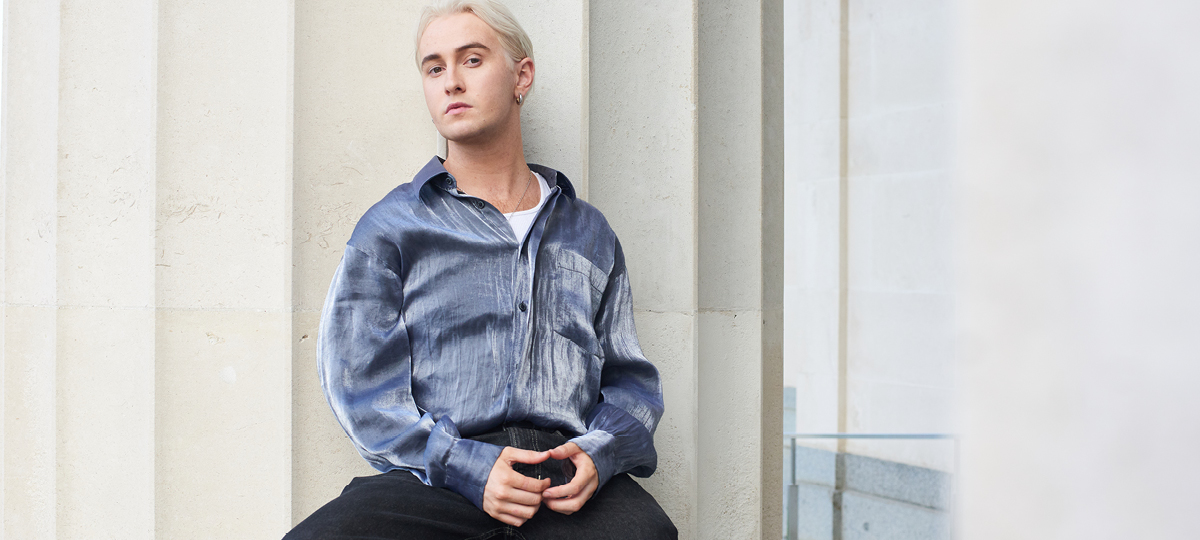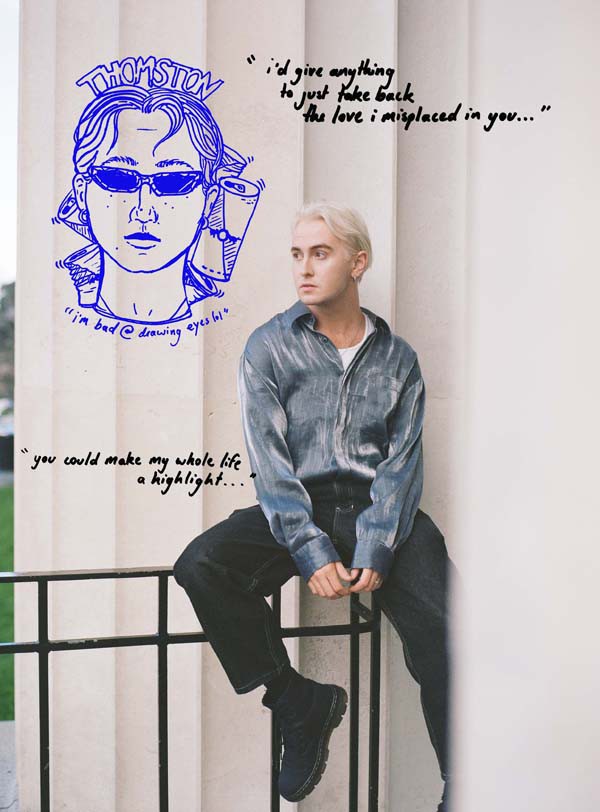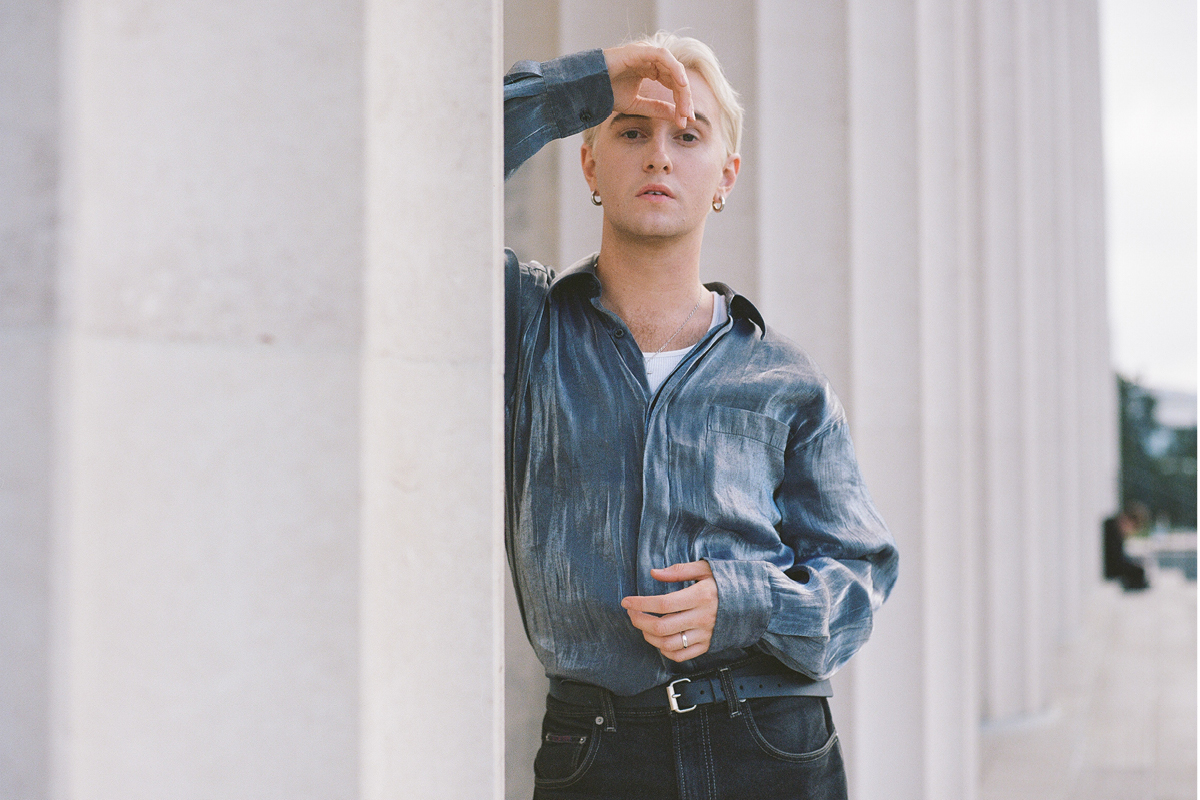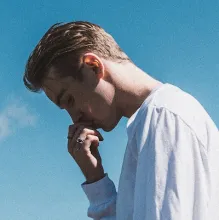
It's been three years since Thomston first shared his debut album 'Topograph', a collection of intensely emotional songs - so deeply personal that Thomas Stoneman struggled to perform them in a live setting.
Cut to last month at his headline Auckland show, and Stoneman's newer material is euphoric in comparison - songs like 'Los Angeles' and 'Godsend' showcasing another side to his songwriting talents.
Having now shared not one, but two new EPs (one an ode to 'Los Angeles', the other to 'London'), we spoke with Thomston about the new songs, loneliness in our generation, and more...
...the more that you give yourself to people, the more you throw yourself in head first - not just relationships, but friendships, and work - and the more you have to lose, because you’ve put yourself wholeheartedly into something. Then if things don’t pan out for whatever reason, it does take more energy to bring yourself back to the place where you’re ready to do it all over again. That was something I had slowly realised after going a little bit too hard in some friendships and relationships.
[This interview is available as part of our NZ On Air physical print zine which is free! Click here for more info.]

COUP DE MAIN: You’ve said that you found the shows you did for ‘Topograph’ really hard to do. Have you found a way to cope with performing emotional songs live?
THOMSTON: I think what I’ve done is just balanced it with songs that are less heavy. I think earlier I had songs that were majority depressing, and now I have some songs that are genuinely uplifting. It means that when I do a really heavy song, not only is it more poignant, but it’s also not as draining - it’s just a moment in the set to reflect, and a moment to really connect. When I do ‘Collarbones’, depending on the set-up of the venue, I try to sit on the edge of the stage or jump down and be at the same level as everyone, and I find that it’s a really nice moment.
CDM: It’s like you want to channel the emotion, but I’m sure it can also be overwhelming?
THOMSTON: It does definitely take it out of me to play those songs, but there’s something to be said of having it between two moments of happiness and trying to be uplifting, where it makes it a lot more manageable.
CDM: It’s cool that you’re so self-aware of how your music makes your fans feel, and that you want them to feel happy. Why do you think sharing happiness, as opposed to sharing sadness is so important to do? Especially in 2019?
THOMSTON: I think that hits the nail on the head, we do live in a really weird time. Before one of the Australian shows, I watched Greta Thunberg’s UN speech, and read a bunch of the comments from old people who were ripping into her. I was really down about it, and it’s not that I have this hero-saviour complex where I think that my music is going to save the world and fix climate change, <laughs> but I think that there’s something to be said for having a moment to try and lift up the people around you so that people have the emotional energy to pour themselves into things that matter, like campaigning for young people to vote, or to sign the Equality Act, or to make big systematic change to combat environmental catastrophe. I definitely don’t think that what I’m doing is helping any of those things in a direct way--
CDM: But there is something to be said for going to a live show and feeling happy, and having more capacity to care about the things around you, and maybe feel empowered to make changes.
THOMSTON: It can charge you up, and you can expend that energy into a place of your choosing - rather than being constantly on the couch and constantly drained and sad, which is so easy.

CDM: On July 6, you shared a statement on your Instagram sharing that some of the songs on the next album are about girls, and some about boys. Why was it important for you to share that with your listeners?
THOMSTON: I think it was something that I felt was overdue. The only thing that had stopped me in the past was thinking that it could be misconstrued as opportunistic. Right now, being anything other than a straight white man is a little bit of a currency when it comes to people taking your voice seriously, and people thinking you have something to say. I think we have spent so long hearing the stories of a really specific group of people and now we’re moving into this time where people are wanting to hear the experiences of people who have gone through it, and people who have dealt with systematic struggle. I felt guilty that I hadn’t been through much in my life, on a systematic level, I hadn’t been discriminated against because of my race or my gender, so I felt that coming out might be viewed as this weird, disingenuous thing, where it’s like, ‘Oh, he just wants people to think he’s more interesting.’
CDM: That’s awful you had to be thinking about the potential repercussions of sharing something like that.
THOMSTON: I think the only thing that made me decide to do it was me coming to the realisation that it could be really important to the people that have been following me, to hear that, because people want to see themselves in the art that they listen to, and just knowing that might be a big source of comfort. I’ve had people reach out to me since, and it was super supportive. It was a really cool moment. It wasn’t like I thought it was going to go badly, I was just worried about how it could look. I’m always thinking about stuff like that. Earlier on in my career, somebody told me, “Why don’t you just come out as bisexual? It’ll be more interesting.” Somebody said that to me, without knowing.
CDM: I hate that so much of music is just about branding and marketing points.
THOMSTON: Yeah, that’s all it comes down to. You see people get press that heavily focuses on their identity outside of the music that they’re making. They apply an intrinsic correlation between the output of the music and the identity, and they’re like, ‘They can only make this song because they’re like this,’ which I think is dangerous, it means that people are so wrapped up in their brand that the focus is becoming less on the music and more on the PR angle, which freaks me out.
CDM: I like the line in ‘Casual’, “You could do better but you’re scared to be alone,” it’s quite relatable. Why do you think loneliness is such a commonly felt emotion in our generation, even though we are so hyper-connected online?
THOMSTON: We have this pseudo-connection with people; you’re able to reach them at anytime. I feel like people used to be so isolated that they really craved connections with other people, so people would go out and make an effort to see each other a lot more. Whereas now you can talk to someone on the internet for fifteen minutes and be like, ‘I guess I’ve kind of seen them, in a way,’ which I think breeds this really specific kind of loneliness where people don’t realise they’re lonely. They have this weird isolated feeling where they don’t feel like people understand them and they don’t feel like people know them on a deep level, but they feel like they’ve had a bunch of interactions. So I think you get this weird disconnect between what we think loneliness is and what loneliness actually is, and that’s what that line in that song is about. We sometimes settle for things that aren’t ideal because we have this weird undiagnosed loneliness.

CDM: I love the sentiment of Los Angeles; “You’re my little piece of Los Angeles.” Why do you think that people and places are often so intertwined?
THOMSTON: I think it’s that thing where because we are talking to people on the internet, when you actually see someone and go somewhere with them, see a city or see part of a city, you intrinsically link them. I loved the idea of Los Angeles being this mecca of hopes and dreams - people make this pilgrimage out to it to try and make it in whatever industry, and I loved the idea of Los Angeles having this really personal, single person connection where it condenses all these hopes and dreams and plans for a future into one thing.
CDM: Have you played that song live yet?
THOMSTON: Yeah, I’ve played it on the Australian leg!
CDM: I feel like compared to some of your older work, performing a song like 'Los Angeles' live is going to feel so good to perform!
THOMSTON: It’s the highlight of every single show. It’s weird, I wait for that song to come up. I should open the show with it. <laughs> It’s so weird. No matter how the show is going, when we do that song it feels like I’m pulled right into that moment, and I’m super happy.
CDM: In ‘2 Years’ you sing, “I’m scared that I’ll only remember the fights.” Why do you think that looking back, we tend to only remember the bad parts of relationships?
THOMSTON: I think it’s a defence mechanism. It’s your brain wanting to protect you from being hurt again, so it zeros in on the things that most negatively impacted you, and it allows those things to take up the most space. I think if you don’t think that way, it opens you up to being hurt a lot more. There’s a positive and a negative to that, if you become so closed off to other people, you don’t allow yourself to have moments of actual joy, but in saying that, there is something smart about remembering negative things and giving that more weight.

CDM: What was running through your mind when writing ‘Godsend’? The bridge is so good!!
THOMSTON: That song is intrinsically linked with spirituality. I grew up in church, and I learnt a lot about this specific idea of what love is in a church environment. I don’t think that it was wrong, I just think that it was made for specific people. It was just about the unexpected joy of finding love in a place that you didn’t expect, and then it being all-encompassing, and feeling like it could be your whole life, and your whole world wrapped up into it, which I really struggled to capture, but ‘Godsend’ came really easily as soon as it started. As soon as it started, it was like word vomit.
CDM: I love the line in ‘Middle Name’ when you sing, “No one told me that the more you love you lose.” Is that a realisation you came to recently?
THOMSTON: I wrote that song years ago actually, like four years ago. I don’t think I honestly knew what love was back then! I think the key to that line is what comes at the end, so it’s, “No one told me that the more you love you lose / The more it takes to pull together.” I think it’s the more that you give yourself to people, the more you throw yourself in head first - not just relationships, but friendships, and work - and the more you have to lose, because you’ve put yourself wholeheartedly into something. Then if things don’t pan out for whatever reason, it does take more energy to bring yourself back to the place where you’re ready to do it all over again. That was something I had slowly realised after going a little bit too hard in some friendships and relationships.
CDM: It’s crazy you wrote the line so long ago, but maybe only came to understand it recently?
THOMSTON: I have this weird thing, I’ve written songs about something vague in my life but I’ve exaggerated details, and then I went and lived through that experience later. I’m worried I’m a little bit psychic, or I’m making it come true. <laughs> My next song ‘I’m A Trillionaire’, it’s gonna be a smash.

CDM: Why do you find it so important to be involved in the production of your music?
THOMSTON: I think it helps to get your vision across, and I think it’s really difficult to make the music you want to make if you don’t know how to talk about technical things, and if you don’t understand the process. Making my first two EPs and my first record with Josh Fountain, I just watched him like a hawk. Then when I spent a year writing and producing by myself, it meant that I had picked up on things that I hadn’t even realised, and I was a lot more equipped than I thought. I was having a meeting the other day and someone said my best stuff is the stuff I’ve done alone, and that’s a big reassurance. I think if you give too much control to other people, when you see success it’s hard to know whether that success is your own or if it’s the other people’s and that can feel like a really fickle and fragile thing, to be like, ‘Oh, that song did really well. But would I have written that song with someone else, or did it require that person?’ The fact that ‘Acid Rain’ is my most successful song to date, and it’s one that I wrote completely by myself and produced completely by myself, is very comforting.
PHOTOGRAPHY BY KAREN ISHIGURO
GROOMING BY HAZEL XU
Thomston's double EP 'En-Route: Los Angeles and London' is out now - listen to our favourite song 'Godsend' below...


 Thomston
Thomston